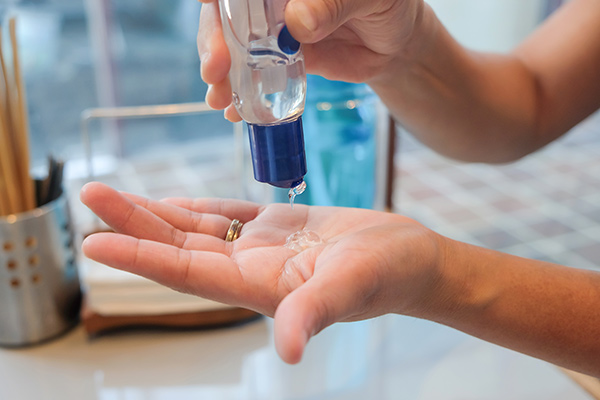 Hospital grade sanitizers need to contain at least 70% ethanol (or isopropyl alcohol) – but stabilising this much ethanol in a formula can be difficult, as there are only a few polymers that will provide a good gel form and stabilising network with a good shelf life. This much ethanol in a formula can also be very drying to the hands, especially when applying it – and reapplying it – regularly throughout the day. In this video, Belinda Carli, Director of the Institute of Personal Care Science, not only shows you some good material choices to use to ensure a stable, clear gel forms, but also how to combat the drying effects of so much ethanol in a formula. She also talks you through important safety information when formulating products with this much ethanol both during manufacture and transport.
Hospital grade sanitizers need to contain at least 70% ethanol (or isopropyl alcohol) – but stabilising this much ethanol in a formula can be difficult, as there are only a few polymers that will provide a good gel form and stabilising network with a good shelf life. This much ethanol in a formula can also be very drying to the hands, especially when applying it – and reapplying it – regularly throughout the day. In this video, Belinda Carli, Director of the Institute of Personal Care Science, not only shows you some good material choices to use to ensure a stable, clear gel forms, but also how to combat the drying effects of so much ethanol in a formula. She also talks you through important safety information when formulating products with this much ethanol both during manufacture and transport.
Watch this video to find out how to create hospital grade sanitizing hand gels easily using the right materials. For the FREE formula for this video, and additional information and videos on multiple types of sanitizing products, please visit this page: https://personalcarescience.com.au/n/HandSanitizerFormulas-499-68/ On this page you’ll also find helpful information about alternative ingredients and sanitizer ‘myth busters’ to help provide you with factual information. Happy formulating!
Looking for products for use in cosmetic formulations?
Prospector can help you find the products you need for your next formulation. Find technical data, request samples, and connect with global suppliers in just a few clicks.
Search for ingredients on Prospector
More cosmetic formulation videos
- Cosmetic Expiry Date – Shelf Life – Stability Testing
- Making Cosmetics with Vitamin E Antioxidant
- How to Make Natural Hair Oils
- Create Your Own Liposomes
- Make It Personal: Formulating Customisable Cosmetics
- The Diversity of Cosmetic Silicones and Their Natural Alternatives
- How to Select Natural Surfactants
The views, opinions and technical analyses presented here are those of the author or advertiser, and are not necessarily those of ULProspector.com or UL Solutions. The appearance of this content in the UL Prospector Knowledge Center does not constitute an endorsement by UL Solutions or its affiliates.
All content is subject to copyright and may not be reproduced without prior authorization from UL Solutions or the content author.
The content has been made available for informational and educational purposes only. While the editors of this site may verify the accuracy of its content from time to time, we assume no responsibility for errors made by the author, editorial staff or any other contributor.
UL Solutions does not make any representations or warranties with respect to the accuracy, applicability, fitness or completeness of the content. UL Solutions does not warrant the performance, effectiveness or applicability of sites listed or linked to in any content.



Dear Belinda,
Do you have benzalkonium chloride sanitizer formulation? If yes, can you make a video to show its preparation.
Thank you.
For full formula details including inputs and supplier information, please email: [email protected]
Thanks – inspiring
Excelente
Hello,
I’m curious about the % alcohol listed for ‘hospital grade’. is this considered different from market product for the public? what are the differences in efficacy and claims.
I heard that FDA is requesting more data for efficacy of ethanol, iPA, and BAC — also 60% ethanol and 70% IPA are recommended.
thanks for your feedback!
Dear Belinda
Thank you so much , it is very interesting as information ,
We can use the benzalkonium chloride in the formulation of the hand gel sanitizer! and what is the recommanded lovel use ? can we use it with reduction of Ethanol , for exemple combination of (60% Ethanol, and 0.1% or 0.2% of Benzalkonium chloride)? What do you think…?
Best Regards
I’m curious why denatured alcohol is not recommended.
I have denatured alcohol at 96% and it would seem that I cannot use this in your formulations.
Do I understand this correctly?
For more videos and information on sanitizing products, please visit this page: https://personalcarescience.com.au/n/HandSanitizerFormulas-499-68/
Happy formulating!
For more videos and information on sanitizing products, please visit this page: https://personalcarescience.com.au/n/HandSanitizerFormulas-499-68/
Happy formulating!
Hi I’m looking to purchase a polymer to gel sanitizer .
Could you please direct to a distributor. My business is currently located in Toronto,ON,Canada.
Thanking you in advance,
Marco Milan
For more videos and information on sanitizing products, please visit this page: https://personalcarescience.com.au/n/HandSanitizerFormulas-499-68/
Happy formulating!
For more videos and information on sanitizing products, please visit this page: https://personalcarescience.com.au/n/HandSanitizerFormulas-499-68/
Happy formulating!
I’m aware that denaturated alcohol legislation depends from country to country. In some countries, denaturation can be done using ingredients that are accepted in cosmetic applications and can even enhance the efficacy of the product.
Thank you for reading. Happy formulating!
Belinda
I think Isopropyl Alcohol is a safe option in terms of using them for hand sanitization on a regular basis. As for drying, many of the hand sanitizers nowadays are using aloe vera extract to prevent hand dryness.